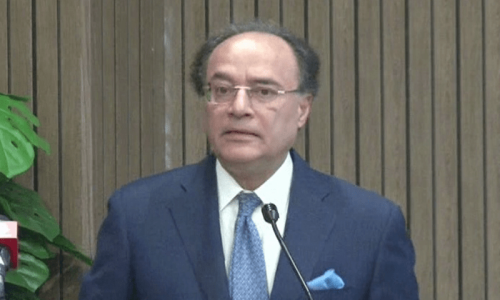After much frustration over the National Accountability Bureau's (NAB) proceedings against several powerful individuals accused of corruption, the PPP-led provincial government in Sindh on Monday passed a bill to repeal the applicability of the National Accountability Ordinance (NAO) 1999 to the province, DawnNews reported.
The National Accountability Ordinance 1999 Repeal Bill 2017, introduced by the PPP, aimed to repeal the applicability of the NAO in departments and autonomous bodies controlled by the provincial government.
The bill drew a strong reaction from a well-prepared opposition, resulting in ruckus on the floor of the Sindh Assembly.
Without naming names, Leader of the Opposition Khawaja Izharul Hassan accused the ministers presenting the bill to be wanted by NAB. He added that multiple members of the assembly and ministers from PPP were also wanted by NAB.
PPP members, terming the current law a 'black law', added that they were acting within their constitutional right to revoke it and give greater powers to the provincial anti-corruption department.
In an attempt to convince them to support the bill, MPAs reminded Muttahida Qaumi Movement Pakistan (MQM-P) leaders, the party Hassan belongs to, that party stalwart Farooq Sattar had also had to suffer the NAB's 'heavy handedness'.
The provincial government will now have to establish a provincial commission on accountability. All corruption cases against provincial lawmakers and officials will be referred to an anti-corruption department overseen by the Sindh government.
Speaking to the media after the session, Hassan said the bill was a violation of Articles 248, 143, 8 and 31 of the Constitution.
"Article 31 clearly states that a law cannot be against Islamic teachings," Hassan said.
If the bill passes, PPP will become judges to their own acts, he said, adding that the responsibility of ensuring that the bill does not come into effect now lies with the Sindh governor.
"We will go to the courts and take to the streets," the opposition leader warned.
"Every time someone talks about corruption in the country, the PPP's name is on the top," he alleged.
The bill was tabled just a few days after NAB announced it would expand the scope of its investigation against alleged corruption and irregularities in different departments of Sindh, particularly in Karachi.
Recently, the bureau’s executive board had authorised an inquiry against officials of the Workers Welfare Board (WWB) and the revenue department of Gadap town in Karachi.
The board had also approved an inquiry against officers of Sindh police into the alleged embezzlement of funds.
Earlier, NAB Karachi had arrested Manzar Abbas, chairman of the Benazir Housing Cell (BHC), for alleged misappropriation of Rs367.5m of the cell’s funds.
The bureau is also currently investigating two cases relating to the Sindh Building Control Authority (SBCA).
The Sindh Assembly was to meet in August, but a session was unexpectedly summoned today after a cabinet meeting which decided to repeal the National Accountability Ordinance.
The opposition parties had already announced it would offer strict resistance to the bill. The opposition had also threatened it would take the issue to court.
Both the treasury and opposition benches had discussed their strategy with their members in two separate meetings before their final show of muscle in the assembly.
Hassan had also announced that if the bill was passed hurriedly without referring it to the relevant standing committee for evaluation, "we would appeal to the Sindh governor not to give his assent before the court’s decision on the matter".
He was of the opinion that if the Sindh government was keen to change the nomenclature of accountability with some other name, it could amend the law instead of repealing it.
He viewed that the 18th Amendment did not allow any provincial government to damage the concept of the federation because the province, under Article 143 of the Constitution, is not a separate state, but part of the federation.
Legal expert Shaiq Usmani had told DawnNews that under Article 143 of the Constitution, a provincial government can not repeal a law passed by the National Assembly. He further said that under Article 147 of the Constitution, the federal government can interfere if the Sindh government passes a law against NAB.














































